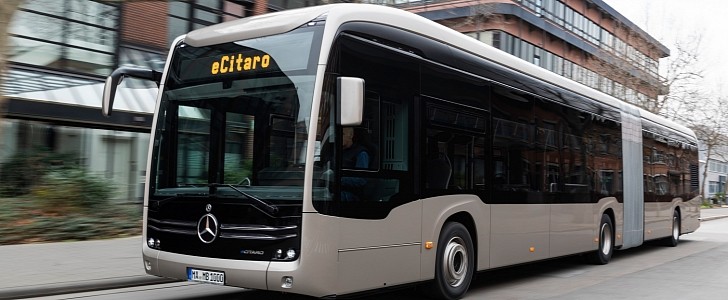Judging by their current model lines, global automakers are not exactly ready to widely adopt electric propulsion in mass-market applications. But they are still keen on developing and adopting the latest technologies in hope of discovering a possible “Holy Grail.” And they play it safe by going with limited-series or simply upsizing everything. Still, from time to time they jump the gun on innovations... in a big way.
Mercedes-Benz is well known not just for its luxury automobiles, but also for its deep implication across all levels of the commercial vehicle sector. As such, many cities around the world haul tens of thousands of people per day in vehicles wearing the three-point star for a badge. Of course, these are produced by the bus division of the German group.
And, as it turns out, the company’s latest idea could be its most significant yet. The new, fully electric, Mercedes-Benz eCitaro G is already no ordinary bus thanks to its articulated body. But what really sets it apart in the bus segment, and quite possibly across the entire automotive realm, is its use of the innovative solid-state battery technology.
The concept – as the name implies – makes use of solid electrodes and a solid electrolyte, in lieu of the conventional lithium-ion or lithium-polymer technology.
The tech is very interesting for automakers because of the potential gains in terms of safety and energy density, but has been treated as a next-generation evolution that will appear over the coming years, not on a series-produced vehicle ready to start manufacturing.
The first articulated bus from Mercedes-Benz, the eCitaro G, will also be first vehicle in its category in the world to use solid-state batteries. The company touts a 25% increase in energy density compared to a conventional lithium-ion setup, up to an energy content of 441 kWh.
Mercedes-Benz also promises an environmentally friendlier manufacturing process because the solid-state type is free of cobalt use, while durability should not be an issue either for early adopters, with an advertised basic guarantee of up to a decade.
A potential downside would be the technology’s restricted fast-charging capability – and the bus maker offers a new generation NMC (nickel-manganese-cobalt) setup, which has an increased total capacity of 396 kWh. More so, Mercedes-Benz is also announcing its intention to equip the regular eCitaro with the two new battery options going forward.
And, as it turns out, the company’s latest idea could be its most significant yet. The new, fully electric, Mercedes-Benz eCitaro G is already no ordinary bus thanks to its articulated body. But what really sets it apart in the bus segment, and quite possibly across the entire automotive realm, is its use of the innovative solid-state battery technology.
The concept – as the name implies – makes use of solid electrodes and a solid electrolyte, in lieu of the conventional lithium-ion or lithium-polymer technology.
The tech is very interesting for automakers because of the potential gains in terms of safety and energy density, but has been treated as a next-generation evolution that will appear over the coming years, not on a series-produced vehicle ready to start manufacturing.
The first articulated bus from Mercedes-Benz, the eCitaro G, will also be first vehicle in its category in the world to use solid-state batteries. The company touts a 25% increase in energy density compared to a conventional lithium-ion setup, up to an energy content of 441 kWh.
Mercedes-Benz also promises an environmentally friendlier manufacturing process because the solid-state type is free of cobalt use, while durability should not be an issue either for early adopters, with an advertised basic guarantee of up to a decade.
A potential downside would be the technology’s restricted fast-charging capability – and the bus maker offers a new generation NMC (nickel-manganese-cobalt) setup, which has an increased total capacity of 396 kWh. More so, Mercedes-Benz is also announcing its intention to equip the regular eCitaro with the two new battery options going forward.






